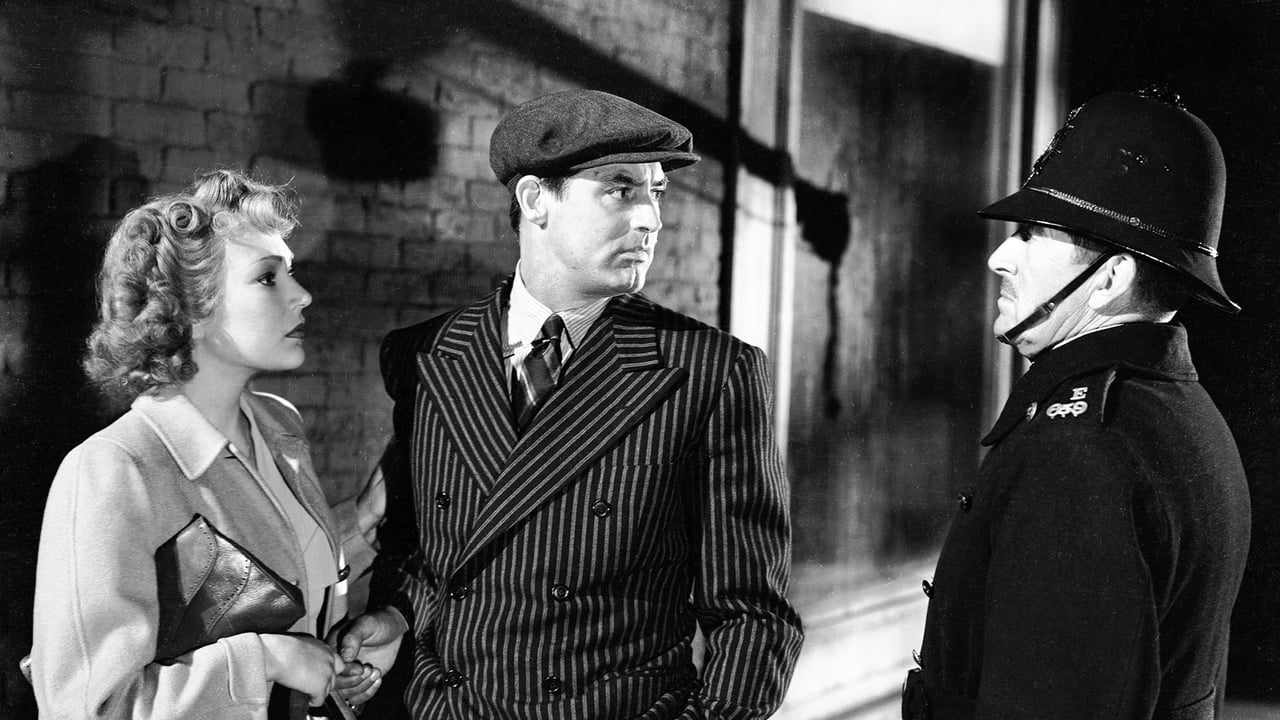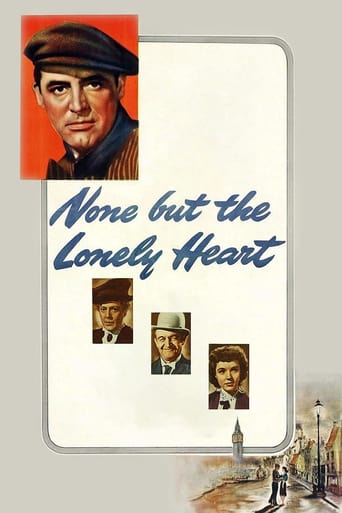

one of my absolute favorites!
... View MoreI like Black Panther, but I didn't like this movie.
... View MoreIt is interesting even when nothing much happens, which is for most of its 3-hour running time. Read full review
... View MoreTrue to its essence, the characters remain on the same line and manage to entertain the viewer, each highlighting their own distinctive qualities or touches.
... View MoreThis film is renowned for starting off Ethel Barrymore on her belated screen career (after a couple of tryouts made much earlier, including one – the as-yet unwatched RASPUTIN AND THE EMPRESS {1933} – with siblings Lionel and John!); she won a Best Supporting Actress Oscar for her fine work here – in all, the legendary star would be nominated four times in the 10-year span until her death. Two other notable elements to the movie under review is its being one of only two titles helmed by respected playwright Odets (the other being THE STORY ON PAGE ONE {1959} which, again, I own but still need to go through) and the fact that it landed nominal lead Cary Grant his second and last Academy Award nod (having previously been shortlisted for George Stevens' romantic drama PENNY SERENADE {1941}) until being bestowed with an Honorary "Lifetime Achievement" golden statuette in 1970 (and, in fact, he mentioned these two directors specifically in that speech). The film was based on a novel by Richard Llewellyn, whose "How Green Was My Valley" had just been brought to the screen by John Ford and managed to sweep, or should I say swipe, five Oscars including Best Picture and Direction at the 1942 ceremony: while an undeniably excellent effort, it notoriously triumphed over such superior candidates as the seminal debut of both Orson Welles and John Huston – namely CITIZEN KANE and THE MALTESE FALCON respectively! It is safe to assume that NONE BUT THE LONELY HEART clearly aimed at repeating the success of HOW GREEN WAS MY VALLEY: while it did garner a total of four nominations (the other two being in the Best Editing and Dramatic/Comedy Score departments), the narrative in this case did not quite have the necessary to obtain a comparable level of quality. Among Llewellyn's other credits were NOOSE (1948), a little-known but pretty good British noir he personally adapted from his play and which co-starred Maltese character actor Joseph Calleia. Anyway, Grant here is a wanderer forever flanked by a pitbull who returns to his London home intending to stay for only a short while, but two events (learning of shopkeeper mother Barrymore's terminal illness – their relationship is otherwise strained – and falling for June Duprez – married to scoundrel George Coulouris) lead to a change of mind and eventually ground him. For the young woman's sake, he becomes embroiled in her husband's criminal schemes (one of their victims being Konstantin Shayne, a close acquaintance of Barrymore's, in a robbery sequence which, along with a car crash later on, constitute action highlights amid the general verbosity) and, to complicate matters further, the old woman is herself arrested for dealing in stolen goods! In the end, while resigning himself to his mother's loss, he follows her advise to find a "good" rather than a "cheap" woman – and he settles on musician Jane Wyatt (the title, in fact, refers to a Tchaikovsky composition she plays on her violin: she had loved him all along, but was willing to sacrifice her personal happiness after Grant professed his feelings for Duprez to her!).Making for unusual wartime fare – which proves interesting without being particularly compelling – the film certainly deserves a mark for trying. Still, the London detail is unconvincing and the cast decidedly variable: the afore-mentioned Grant (rather effective in a rare depiction of his true Cockney origins, apart from the final descent into bathos), Barrymore, Coulouris and Shayne come off best, as well as Barry Fitzgerald (also in HOW GREEN WAS MY VALLEY and who made Oscar history that same year by being nominated twice for his role in GOING MY WAY – being thus in direct competition with the star in the Best Actor stakes while emerging the winner, and therefore Barrymore's male counterpart, in the Supporting category!); on the other hand, Wyatt and Duprez are somewhat weak under the circumstances, whereas Dan Duryea is thoroughly wasted as a bartender.
... View MoreCary Grant is much too handsome,too aristocratic ,to play the part of this prodigal son and it is one of his more painful part.A loser he just cannot be.Ethel Barrymore ,on the other hand ,saves the movie ,with a balanced portrayal of a woman who ,in a way,as sonny says,exploits the others' poverty;and the most touching scene might be that of the cage ,when Grant gives the bird back to the woman in tears . Directing is static,trying to create an English atmosphere with fish and ships and pounds;but didn't they forget that cars run on the left in Albion ?(see the car chase) .Sometimes the music rises and we feel something important is about to happen :but nothing essential occurs.All the elements of melodrama are present :a bad son,who will redeem his soul,a fatal disease,bad influences , a divorced girl with a little child,and even an imprisoned mom, but the mixture lacks consistency and even the final is not convincing ,being particularly gloomy.the hero's middle name is "Verdun" ,the French town where his father fights in WW1
... View MoreCary Grant reinvented himself as a Hollywood film star with an American accent, but before he did that, his real name was Archie Leach, from Bristol, and as English as they come. In this film, he returns to his roots and very successfully plays an Englishman. The film is a very moving and effective story about a young man reluctantly coming to terms with what it means to be responsible and sensible, and giving up a rather wild and unconstrained existence which was leading nowhere. It is superbly directed by the playwright Clifford Odets, who also wrote the screenplay, which is based upon a novel by the Welshman Richard Llewellyn, who is more famous for his novel HOW GREEN WAS MY VALLEY (filmed in 1941). This was one of only two films directed by Odets, the other being fifteen years later, THE STORY ON PAGE ONE (1959, which is such a bad film I did not bother to review it). However, this earlier directorial achievement by Odets was really one to be proud of, and totally works. The film takes its title from the famous song by Pyotr Tchaikovsky, a tune played by the character Aggie Hunter in the film, who is sensitively played by Jane Wyatt. Wyatt plays the cello herself on screen. The same theme tune is also played on the piano by Cary Grant, also really playing the instrument himself. Another excellent pianist/actor appears in the film, Dan Duryea, but he only has a small part and does not play any music. This film is remarkable for the stunning performance by Helen Duprez as a steamy and passionate gal who falls for Cary Grant. Helen Duprez is so amazing in this film that she equals Gloria Grahame for effortlessly conveying intense sensuality on the screen, just by the way she talks, looks, and moves. It is one of the great tragedies of the cinema that Helen Duprez's career misfired (see the account in her bio on IMDb), for she was truly in a class of her own. Anyone interested in the history of screen passion without bedroom scenes needs to study this performance, and see how it is done. Clifford Odets obviously knew how to get Duprez's magic out of her, by gaining her confidence and giving her the necessary encouragement. Although it was Ethel Barrymore, who played Cary Grant's mother, who got the Oscar for her performance in this film, that Oscar should really have gone to Helen Duprez. That is not to say that Ethel Barrymore's performance is not marvellous, for it is. She shows extreme subtlety in a part which a lesser actress would have played with broad strokes and would have hammed it up. This is a wonderfully successful film which deserves to be more widely known.
... View MoreThe film supposedly involves Cary Grant playing himself on sets that evoke his impoverished English childhood, in an anguished drama involving a mother that evokes his anguished mother.I don't know how much of the film had personal meaning to Cary (and how much of the meaning was generated by a publicity department, or imagined by fans) but the result is unsatisfying. Cary despite his genuine Cockney childhood is not convincing as a Cockney, and he comes across as the main wrong note in the film. Like the rest of the sentient universe I am a huge fan generally, and if one felt like arguing, one could argue that Cary's ineptness because it is so rare is revealing. It suggests a conflict -- seen especially early in the movie -- between being Cary Grant, being that English street character he spent his entire life disguising, and whatever this part required. So maybe something personal was at stake, but that's not necessarily the formula for a good movie, and here it isn't.The sets are great though, in a dark "foggy old London curiosity shoppe" kind of way. Ethel Barrymore is... well, Ethel Barrymore and enough said. Eternally noble Jane Wyatt is eternally noble (but we love her that way); in fact everyone is fine, including the fog, played by itself.Except Cary and the story.
... View More